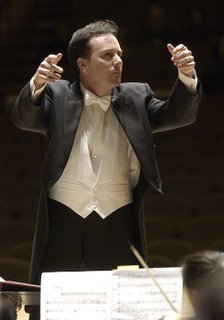
Ryan Brown, director of Opera Lafayette |
If Opera Lafayette's current season has had its ups and downs, Friday night's performance of most of Handel's L'Allegro, il Penseroso, ed il Moderato, from 1740, at the Kennedy Center Terrace Theater was one of the ups. Charles Jennens adapted the libretto from two separate poems by John Milton -- one in the voice of a happy man, L'Allegro, and the other melancholy, Il Penseroso. Jennens chose excerpts from the two poems, interweaving them in a quasi-operatic dialogue, as if they were trying to convince one another to change moods. Jennens then added a third part, in the voice of a man whose mood is a mixture of the two, Il Moderato, who is neither entirely happy nor entirely melancholy. Handel assigned the parts freely, with any of the four vocal soloists incarnating any of the characters, sometimes with the personal pronouns switched to the plural for the chorus to join the dialogue. In this way, L'Allegro is closest to the libretto of Messiah, which Jennens also authored and Handel set to music one year after L'Allegro, in that there are no roles associated with any particular singer. It is a sort of third genre, separate from the more traditionally operatic oratorios.
At this point in his life Handel's health was in an extremely poor state, a subject documented by Handel specialist David Hunter (see the article by Stephanie Pain in New Scientist this month). Coinciding with the failure of his operatic ventures, Handel's binge eating and ballooning weight contributed to many health problems, a paralysis of his hands, increasing irritability and depression, perhaps caused by lead poisoning from excessive indulgence in lead-laced food and wine. It is not clear what benefit was gained from Opera Lafayette cutting the third part of the oratorio, Il Moderato, which adds up to only about 20 minutes of music, other than trying to focus on Milton's poetry, although exclusively in its diced-up form, pieced together by Jennens in the libretto. Is it possible that Jennens at least partially intended the message of moderation for Handel himself? One could certainly read the following lines from the bass's opening pieces that way:Hence, boast not, ye profane,
Of vainly-fancied, little-tasted pleasure,
Pursued beyond all measure,
And by its own excess transform'd to pain. [...]
Sweet temp'rance in thy right hand bear,
With her let rosy health appear.
One of the likely concerns was to avoid the score's excessive longueurs, and like any Handel score, there are some snoozers in L'Allegro. The inclusion of recitations of the libretto text was more laudable in intent than in practice, as the actors invited gave at best mediocre recitations. Omitting them would have left more than enough time to give a complete performance of the work. The only encore offered was the luscious duet As Steals the Morn, from the deleted third part, featured on the Handel disc of the same name by Mark Padmore two years ago, leading one inevitably to wonder if the performance would not have been more worthy with the complete score.
Of course, this is a Handel Year (he died 250 years ago this month), and an exhibit in honor of the event is about to open at the Handel House Museum in London, curated by none other than Christopher Hogwood. (I'm sure that Jessica Duchen will have a full report.) As a way to remember Handel this was most pleasurable, with an overall performance that, while not exactly free of problems, was on the whole very good. The vocal soloists all sang admirably, especially the young tenor Nicholas Phan, whose voice has a pleasing, resonant ping without sounding forced. His crisp sense of attack and clarity served particularly well in one number with the chorus, Haste Thee, Nymph. Soprano Christine Brandes sounded much better here than she did in her last performance to reach these ears, with steely high notes and more than enough strength of sound.
Soprano Ann Monoyios replaced Kirsten Blaise, still listed in the program but described as "ill and unable to perform" in an insert, but the change was not all that recent. Monoyios sang well, although struggling with flatness throughout the evening (especially bad with the solo cello in But oh, sad virgin). She shone in the extended duet with Colin St. Martin on flauto traverso (Sweet bird, that shun'st the noise of folly), where the avian warblings of both were elaborated with charming embellishments. Baritone David Newman, cheated of some of his already smaller portion of music (cut with the third part), sang with a tone that matched the earnestness on his face. The orchestra was generally fine, under the inimitable style of conductor Ryan Brown, all pointed fingers and marching in place. The chamber chorus sang with flair and stylistic subtlety, with the exception of a prominent false entrance in the bass section during Populous cities please us then.
Next year Opera Lafayette will celebrate its fifteenth season, with concerts that include Charpentier's Les Florissants (October 19, Kennedy Center Terrace Theater), Gluck's Armide (February 1, 2010, for the company's debut in the KC Concert Hall), and Philidor's Sancho Panza (May 24, 2010, Terrace Theater) in its American debut.






















































No comments:
Post a Comment